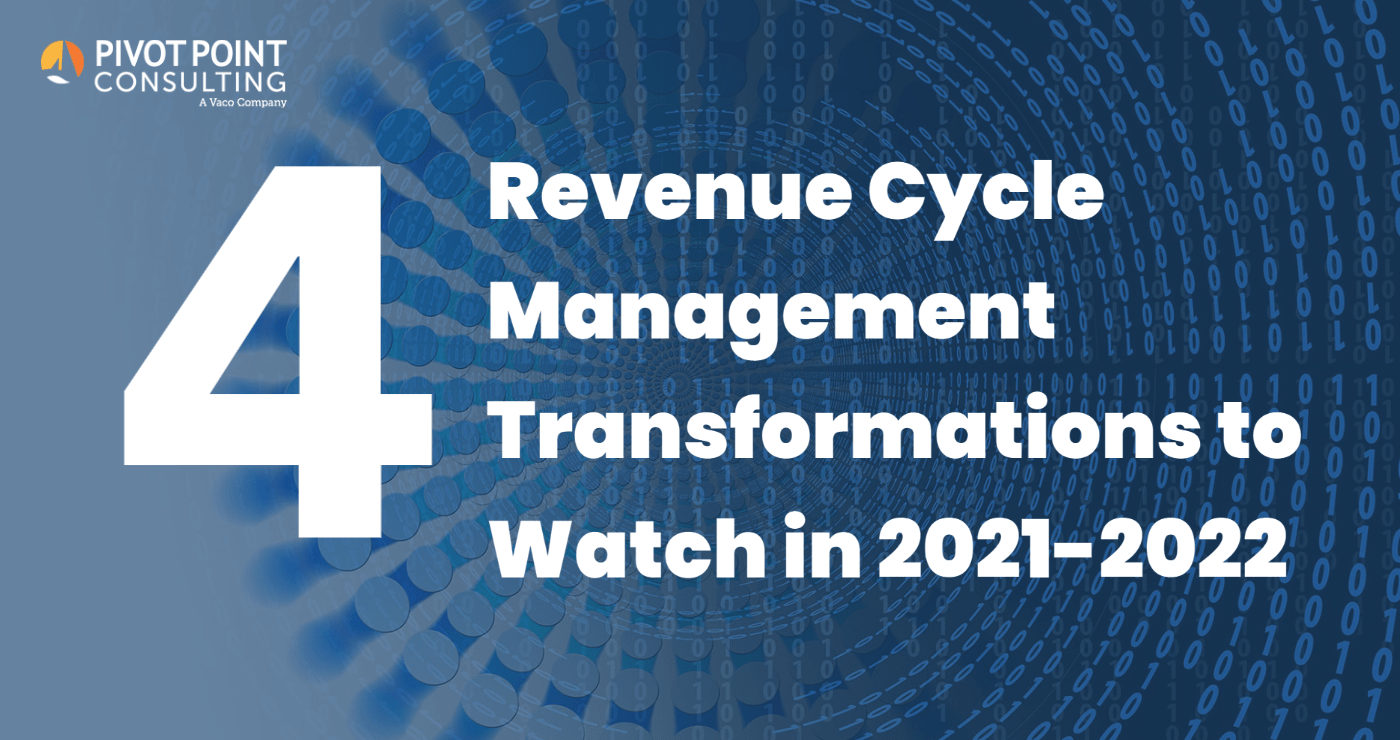Health system and hospital revenue cycle teams faced a flood of changes at the start of the pandemic, many of which continue to have repercussions today. The shutdown and the move to a mostly virtual care environment introduced significant chaos and situations that revenue cycle teams had not faced before. Revenue cycle workforces went to nearly 100% remote working overnight; coding and claims processes were turned upside down in the midst of payer and government changes; and budgets were slashed as elective surgeries grinded to a halt to address the mounting COVID-19 crisis. Now, as hospitals get back to work, finance, revenue cycle and IT leaders are reimagining a stronger, more streamlined and nimbler revenue cycle. Here are 4 critical revenue cycle transformation opportunities to be aware of for your organization in 2021 and 2022.
1. Making the Leap from Denial Management to Denial Mitigation
Denials patterns shifted in unpredictable ways during the pandemic due to the surge of COVID-19 diagnoses, approved ICD-10 diagnostic codes and the transition to telehealth. These changes caused mass confusion as government and commercial payors scrambled to determine new requirements, codes and regulations. Claims submitted during this time of uncertainty for both providers and payors are seeing an increase in coding and clinical denials from which providers are still trying to recover. Providers now have a vast backlog of denials to sort through. They can expect to see more coding and claims denials in the next year from the COVID-19 time period based on everything from incorrect diagnoses to missing codes, as well as fraudulent practices. Yet, there are some silver linings. We are seeing provider organizations pause in the midst of these challenges and move to denials mitigation programs that focus on strengthening front-end processes to prevent denials from happening in the first place. A comprehensive denials prevention program integrates case management and clinical documentation improvement (CDI) into billing and claims processes to collect key information concurrently as opposed to the uphill battle of dealing with appealing denied claims. A denials prevention program can address key pain points—such as shorter hospital LOS and physician office visits—where there is a narrow window to collect the right information and document it correctly in the EHR to avoid a claims denial issue.
2. Fast-tracking Front-end Processes With AI and Other Technologies
The pandemic has also motivated hospitals to create nimbler revenue cycle departments and processes. Hence, they are looking carefully at both IT and revenue cycle budgets and asking their teams to find ways to do things more expeditiously, while improving interoperability. Many hospitals are starting to carve out room in their budgets for AI and robotic process automation (RPA), in particular, to automate more front-end areas of the revenue cycle, including registration and coordination of benefits. Their aim is to capture all necessary patient and payor information up front to prevent backend billing delays and mistakes that could lead to a denial. Hospitals are also using AI to address the issue of duplicate patient IDs, a problem magnified during COVID-19 because of additional required reporting. In fact, duplicate patient IDs are common due to lack of interoperability between hospital EHRs and other technology systems. AI works to mitigate this issue—which flows across the entire revenue cycle, impacting everything from patient eligibility to billing and collections—by providing a system alert when a patient presents with more than one identification. In the past, hospitals have used AI sporadically to solve this issue, but we expect to see a dramatic uptick in its use moving forward. However, organizations will need to proceed carefully due to heightening patient privacy concerns in a post-pandemic world.
3. Re-evaluating Workforce Management
Hospital reduction in workforce efforts during the pandemic forced revenue cycle teams to redeploy existing staff to new areas. One of the fallouts from this shift was not having the right expertise on hand to stay on top of complex and continuously changing payor criteria. Organizations are learning from this experience to dive into 2021 with a new workforce plan. As hospitals move forward and evolve their understanding of payment methodologies and payment integrity inside the health system, they are looking to make sure they have the right people in the right seats, including staff who specialize in specific payors. The intent is to have one revenue cycle expert per payor to stay ahead of vast changes from the major payors. In addition, we expect to see revenue cycle teams bring on regulatory compliance expertise to keep abreast of changing government regulations and collaborate to advance to a digital environment.
4. Managed Services Partnerships Drive Transformation
As organizations launch transformational initiatives, an experienced partner can provide expertise and tools that will help them stay on track and on time. For example, hospitals aim to leverage existing AI, RPA and analytics programs across the revenue cycle instead of purchasing new technology. However, they do not always fully understand their capabilities and how to apply them. A managed services partnership can help map out a plan how to maximize AI and other technologies. Also, during the pandemic, some revenue cycle leaders were pleasantly surprised to see that their remote workforces were productive and performed well at home. As they adjust to the long-term effects of COVID-19, many organizations will keep these remote working arrangements in place and start to take advantage of managed services partnerships to supplement revenue cycle teams and provide top talent in the industry. Healthcare organizations are making their way through the upheaval of the pandemic and using critical lessons learned to move toward a new future. As revenue cycle teams begin the process of transformation, they will leverage their workforces, technology and strategic partnerships to drive new successes.
Did you know?
Pivot Point Consulting’s Core Services Include More Than Staffing.
https://vimeo.com/580903424


